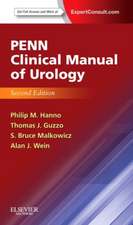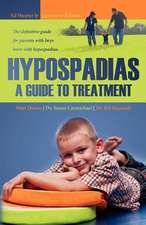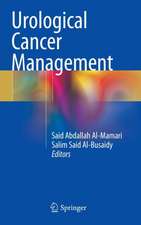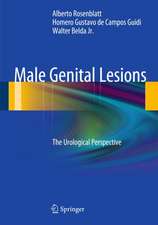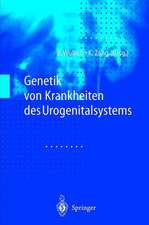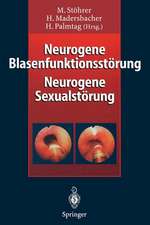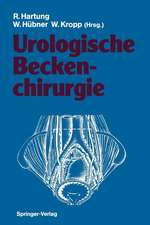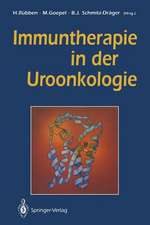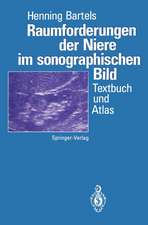The Role of Bacteria in Urology
Editat de Dirk Lange, Kymora B. Scotlanden Limba Engleză Paperback – 15 aug 2020
The Role of Bacteria in Urology is relevant to both clinicians and scientists interested in the infection of the genitourinary system.
| Toate formatele și edițiile | Preț | Express |
|---|---|---|
| Paperback (1) | 332.51 lei 38-44 zile | |
| Springer International Publishing – 15 aug 2020 | 332.51 lei 38-44 zile | |
| Hardback (1) | 342.97 lei 38-44 zile | |
| Springer International Publishing – 7 iun 2019 | 342.97 lei 38-44 zile |
Preț: 332.51 lei
Preț vechi: 350.02 lei
-5% Nou
Puncte Express: 499
Preț estimativ în valută:
63.65€ • 69.16$ • 53.50£
63.65€ • 69.16$ • 53.50£
Carte tipărită la comandă
Livrare economică 17-23 aprilie
Preluare comenzi: 021 569.72.76
Specificații
ISBN-13: 9783030175443
ISBN-10: 3030175448
Pagini: 193
Ilustrații: VIII, 193 p. 16 illus., 12 illus. in color.
Dimensiuni: 155 x 235 mm
Ediția:2nd ed. 2019
Editura: Springer International Publishing
Colecția Springer
Locul publicării:Cham, Switzerland
ISBN-10: 3030175448
Pagini: 193
Ilustrații: VIII, 193 p. 16 illus., 12 illus. in color.
Dimensiuni: 155 x 235 mm
Ediția:2nd ed. 2019
Editura: Springer International Publishing
Colecția Springer
Locul publicării:Cham, Switzerland
Cuprins
1. Bacteria in the Genitourinary Tract: The Microbiota and Probiotics.- 2. Overview of Urinary Tract infections.- 3. Pathogenic Mechanisms of Uropathogens.- 4. Urosepsis: Pathogenesis and Treatment.- 5. Struvite Stone Formation by Ureolytic Biofilm Infections.- 6. The Management of Infection Stones.- 7. The use of Probiotic Bacteria to Treat Recurrent Calcium Oxalate Kidney Stone Disease.- 8. Role of Oxalobacter formigenes Colonization in Calcium Oxalate Kidney Stone Disease.- 9. BCG for the Treatment of Non-Muscle Invasive Bladder Cancer.- 10. The Microbiome in Female Urology.- 11. The Microbiome in the Prostate: Prostatitis and Prostate Cancer.- 12. Beyond Bacteria: The Mycobiome and Virome in Urology.- 13. Metagenomics and the Microbiome.- 14. Urologic Devices: Infection and Encrustation.- 15. Role of Bacteria in Non-infection Stone Formation.- 16. The role of the intestinal microbiome in oxalate homeostasis.
Notă biografică
Dr. Dirk Lange is a microbiologist who earned his Ph.D. in Microbiology and Immunology from the University of Western Ontario (London, Ontario) on understanding the role of the capsular polysaccharide in the pathogenesis of Campylobacter jejuni. Dr. Lange completed his post-doctoral fellowship at The Stone Centre at VGH with Dr. Ben Chew, where he contributed significantly to the area of urinary biomaterial design, providing a basic science perspective to understanding ureteral stent related morbidity. Due to his significant contributions to the research program at the Stone Centre, Dr. Lange was recruited to the Department of Urologic Sciences as an Assistant Professor in 2011, and is also the Director of Basic Science Research at the Stone Centre. Dr. Lange continues to run a research program aimed at studying the role of bacteria in urology, specifically the development of novel therapies for recurrent kidney stone disease based on the intestinal microbiome as well as the development of novel technologies to prevent indwelling device associated urinary tract infections.
Dr. Kymora Scotland is the endourology fellow at the Stone Centre of the Department of Urologic Sciences at the University of British Columbia. Dr. Scotland is a graduate of the Tri-Institutional Cornell/Rockefeller/Sloan Kettering MD-PhD Program with a background in genitourinary pharmacology and molecular biology. She then completed her urology residency at Thomas Jefferson University Hospital where her clinical research concentrated on the endourologic management of kidney stones and upper tract urothelial cancer. Her postgraduate work at the Stone Centre has investigated ureteral stent associated urinary tract infections by further elucidating the mechanism of biofilm formation on stents. Future research endeavors will continue to center on translational work that has direct relevance to her patients. Dr. Scotland will explore the effect of the urinary microbiome on genitourinary disease..
Textul de pe ultima copertă
This updated volume provides a concise guide to the pathogenic, therapeutic, and preventative roles of bacteria in urology. New chapters discussing the involvement of the microbiome in the areas of recurrent kidney stone disease, female urology, and prostate cancer are included. The treatment of urosepsis, stone management, genitourinary malignancy, stone sequencing, and the role of microbiome and virome in urology are also covered.
The Role of Bacteria in Urology is relevant to both clinicians and scientists interested in the infection of the genitourinary system.
The Role of Bacteria in Urology is relevant to both clinicians and scientists interested in the infection of the genitourinary system.
Caracteristici
Discusses the signs and symptoms of urosepsis to help the reader recognise and identify patients suffering from it Feature diagrams and tables illustrating different pathogenic mechanisms used by common uropathogens to give a better understanding of how bacteria infect the urinary tract Covers basic bacterial resistance mechanisms in a concise manner to gives readers an understanding of common bacterial resistance


